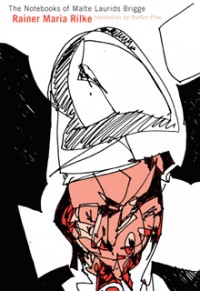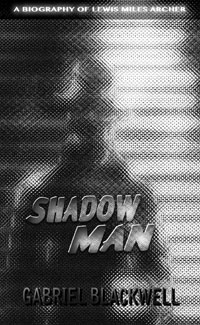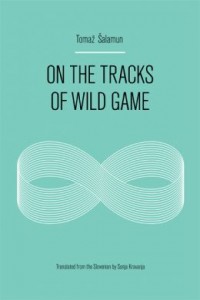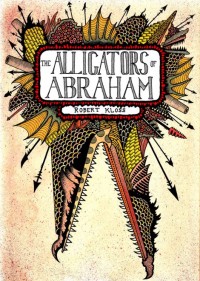 The Notebooks of Malte Laurids Brigge
The Notebooks of Malte Laurids Brigge
by Rainer Maria Rilke, translated by Burton Pike
Dalkey Archive Press, 2008
235 pages / $13.95 buy from Dalkey
1. “So this is where people come in order to live, I would rather thought: to die.” Young Malte Laurids Brigge is talking about Paris. “I have been out. I have seen: hospitals. I saw a man who tottered and collapsed. People gathered around him, that spared me the rest.”
2. Published in 1910, this is Rainer Maria Rilke’s only novel. He is considered one of the most significant poets of the twentieth century and is perhaps best known for Sonnets to Orpheus and the Duino Elegies. I was introduced to him in an undergraduate poetry workshop, taught by Peter Gizzi. He wore a beret and smoked cigarettes in class. He told me: “Read Rilke’s Letters to a Young Poet,” and so I did.
3. This is Burton Pike’s translation, issued by Dalkey Archive in 2008. It has been referred to as an “edgy” translation, a “refreshing” one that attempts to preserve the “strangeness” of the original German. Pike says: “Rilke’s prose in this novel is arresting, haunting, and beautiful, but it is not smooth…. It would be a mistake to translate his German into a smoothed-over literary English. That would be to overemphasize the existential element of Malte’s tribulations, and to obscure the radically experimental and daring nature of Rilke’s prose.”
4. The existential elements of this novel are hard to avoid, whether or not you consider this translation smooth. The preoccupations of Malte, destitute poet arriving in Paris to write, concern death and being and becoming. “The main thing was that one was alive. That was the main thing.”
5. In the city, Malte is becoming. He is “learning to see.” He says: “I don’t know why, everything penetrates me more deeply, and doesn’t stop at the place where it always used to end. There is a place in me I knew nothing about. Everything goes there now. I don’t know what goes on there.”
6. The novel is in two parts: Book One and Book Two. There are fragments and sketches and the idea of “notebooks” is apt. There are ghost stories and inanimate objects that are imbued with energy and life. Scenes from Malte’s childhood bump up against fabrications and medieval legends. It is a book that wanders and circles back on itself. It speaks of death and history and imagination. It concerns itself with fear and fever and art.
7. For the sake of poetry, Malte tells us: “One must be able to think back to paths in unknown regions, to unexpected meetings and to partings one long saw coming; to childhood days that are still not understood…. to childhood illnesses that set in so strangely with so many profound and heavy transformations, to days in quiet, muted rooms and to mornings by the sea, the sea altogether, to nights travelling that rushed up and away and flew with all the stars; and if one can think of all that, it is still not enough. One must have memories of many nights of love, none of which resembled another, of screams in the delivery room and of easy, pale, sleeping women delivered, who are closing themselves. But one must also have been with the dying, have sat by the dead in the room with the open window and the spasmodic noises.”
8. All this is necessary for poetry and Malte is in Paris to write. He is twenty-eight and “just about nothing has happened.” And so “it is still not enough to have memories,” he tells us. “One must be able to forget them, if they are many, and to have the great patience to wait for them to come again. For it is not the memories themselves. Only when they become blood in us, glance and gesture, nameless and no longer to be distinguished from ourselves, only then can it happen that in a rare hour the first word of a line arises in their midst and strides out of them.”
9. And so we are led through these scenes of memory and of historical texts and visions and legends that perhaps have become blood in him. Or are in the process of becoming.
10. In one of a series of questions Malte poses to himself and to his reader, he asks “It is possible that the whole history of the world has been misunderstood? Is it possible that the past is false because one has always spoken of its masses, as if one was telling about a coming together of many people, instead of telling about the one person they were standing around, because he was alien and died?” “Yes, it is possible.” He asks these existential, unanswerable questions, responding to each: “Yes, it is possible.” If it is possible that there are no certainties at all, no universally accepted philosophies of living and dying, then it is incumbent upon him, though “young, irrelevant” to write “day and night, he will just have to write, and that will be that.” This is the young poet’s charge. READ MORE >
 Shadow Man: A Biography of Lewis Miles Archer
Shadow Man: A Biography of Lewis Miles Archer


 The Notebooks of Malte Laurids Brigge
The Notebooks of Malte Laurids Brigge



 The Alligators of Abraham
The Alligators of Abraham